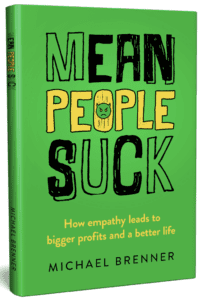
Wouldn’t the world—and marketing—be a whole lot better if people were simply nicer and more understanding of one another? Marketing Insider Group CEO Michael Brenner targets the power of empathy in his new book “Mean People Suck.” We recently chatted with Brenner about why compassion and empathy should be on the mind of marketers and why so many people in general today seem to be lacking in these qualities .
CHIEF MARKETER: Why did you decide to write about empathy?
MICHAEL BRENNER: I was trying to figure out why most marketing sucks. I’ve been asking that question from the day I moved from sales to marketing. I make a joke in my keynotes that behind every bad piece of marketing is an executive who asked for it. The places where I’ve seen marketing struggle is when someone has to go, “okay, do whatever the CEO asks for.” The really strong leaders in marketing are those who see it as strategic and don’t just see it as a task. Empathy has always been the answer, I just didn’t always realize it. It needs to be the job of the CMO, but not enough see it that way.
CM: You write that sometimes marketers have to say no to bad ideas, but that’s a tall order if you’re talking to your CEO.
BRENNER: Sure. As marketers we need to look at what is in it for the customer. If there is no value for the customer, then why are you doing it? At Capgemini, the CEO asked the head of brand communications to sponsor a pro golfer, because all of their competitors were sponsoring golfers. She pushed back. She said “I understand why you think it is a good idea, but what is the value to the customer to spending all this money?” She presented him with research showing that less than 15 percent of their audience was passionate about golf. Another five percent followed golf, but didn’t care and didn’t notice brand sponsors. Her pushback was that they’d be missing nearly 80 percent of the audience.
You May Also Enjoy:
- B2B Customer Experience: Why CX Matters Across the Entire Funnel
- Cause Marketing: Why Brands Should Take a Stand
- The Changing Face of B2B Social Media
CM: At this point in time, why do people seem to…well, suck more? Is it something do with the state of the world? Are people stressed out and not feeling empathetic?
BRENNER: I tried to stay away from politics, but one study I cited looked at political affiliation by empathy level, and they found that there was a 98 percent correlation between empathy and one of the political parties. It’s an outcome, not a cause. From the dawn of digital and social and mobile technologies, I think we started seeing the Edelman trust barometer go down for executives, government officials, politicians.
CM: Why is that?
 BRENNER: Society has gotten meaner, because it is easy to [be mean] on Twitter. The current political environment, the distrust we see in executives, that’s a reflection of those trends. As society evolves we’ll learn to deal with it, because the current state isn’t sustainable. [But there’s] hope, because organizations that want to grow and politicians who want to connect will realize that long term, being an ******* isn’t the way to do it. I think we’re seeing a short term aberration where people are thinking that’s the way to be, but it isn’t sustainable.
BRENNER: Society has gotten meaner, because it is easy to [be mean] on Twitter. The current political environment, the distrust we see in executives, that’s a reflection of those trends. As society evolves we’ll learn to deal with it, because the current state isn’t sustainable. [But there’s] hope, because organizations that want to grow and politicians who want to connect will realize that long term, being an ******* isn’t the way to do it. I think we’re seeing a short term aberration where people are thinking that’s the way to be, but it isn’t sustainable.
CM: In the book, you discuss some early career experiences where people weren’t as empathetic as they could be. Do you think that people focus enough on learning from negative experiences?
BRENNER: No, they don’t. Many people accept a victim mentality –“oh, my boss sucks” or “the company I work with is so traditional”—we make excuses for the situations we’re in and the misery that we’re feeling. The whole reason I wrote the book was because I reflected on the jobs I had. I think if more of us did that we’d start to realize that we moved from being unhappy to happy because we made a choice. Some of it is life lessons and some is marketing advice. Instead of pointing fingers, part of what I’m trying to say is take accountability for yourself first.
CM: Is there a big correlation between customer experience and empathy?
BRENNER: I think empathy is customer experience. I didn’t want to write a customer experience book, because there are plenty of people out there talking about CX. I was speaking to a customer advisory council meeting, and I presented the idea that CMOs should address culture. If you want to own the customer experience, you need to address culture. One CMO of a tech company said “I can’t take on culture—that’s HR’s job. I have too much to do.” I was shocked—you’re too busy doing stuff, to ask if it is the right stuff for your customer experience? If you’re too busy blasting out emails and managing agency relationships, you’re never going to fix your customer experience. It’s not just about empathy, it’s about taking ownership of the culture that defines the customer experience.
CM: Is empathy a trackable metric?
BRENNER: That’s an interesting question. I don’t think you can track empathy, but you can track employee engagement and I think that tracks with empathy. Employees who are engaged in their companies believe that their companies have a higher purpose. Where there is employee engagement, there are higher outcomes.




